International Affairs
 |
 |
 |
 |
 |
 |
 |
Putin and the Soviet ‘Truth’
The strains of the stirring martial music have faded away, so too the rumbling of tanks, personnel carriers and the well-timed clacking of boots on Red Square to commemorate Victory Day, the commemoration of the Soviet victory over Nazi Germany, but Soviet-era myths continue. There is even a new twist to enhance Putin inspired Soviet reverie. Putin's use of Soviet mythology affects not only the Russian people, but also the entire world.
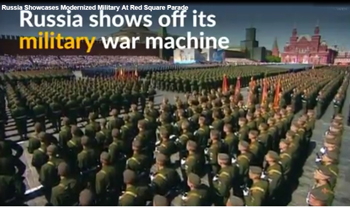
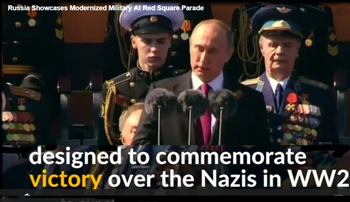 One of the most dearly held myths inherited from the Soviet era is the story of the people of the Union of Soviet Socialist Republics (USSR, Soviet Union) standing virtually alone against and, finally, vanquishing the invading Nazi hordes of Adolf Hitler. While other nations faltered, the Soviet State and people fought the Nazi menace and won.
One of the most dearly held myths inherited from the Soviet era is the story of the people of the Union of Soviet Socialist Republics (USSR, Soviet Union) standing virtually alone against and, finally, vanquishing the invading Nazi hordes of Adolf Hitler. While other nations faltered, the Soviet State and people fought the Nazi menace and won.
Putin stated during his 2017 Moscow Victory Day address that World War II showed that "double standards" and "short-sighted indulgences" bring tragic results. He proclaimed that the Great Patriotic War (WWII) was an "outstanding, sacred heroic deed of our people, a call to live according to conscience, to keep the height of truth and justice..."
The phrases "double standards" and "short-sighted indulgences" referred to pre-WWII Western attempts at appeasing Nazi leader Adolf Hitler. Putin was taking a jab at U.S. and European policies, particularly in Syria. He is saying that the U.S. and its allies are weak in the face of terrorism (because of Western support of anti-Assad rebels), comparing this policy to the West's approach to Hitler in the 1930's. As far as Putin is concerned, any group hostile to Assad is a terrorist organization, but using the Soviet relationship to Nazi Germany as an example of resolute resistance to aggression is, however, absurd.
It does make for excellent propaganda for the Russian people and for pro-Putin allies around the world.
As with all myths, there is truth within the general narrative. On June 22, 1941, Nazi forces launched a surprise attack against Soviet Union driving the Red Army back to the gates of Moscow and Stalingrad. Eventually, and with the help of "general winter," Soviet forces prevailed.
Embarassing facts...
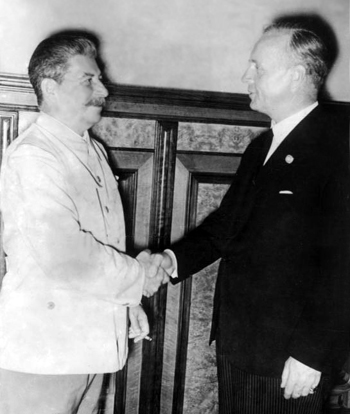 There are also a number of embarrassing facts mentioned neither in the Soviet account nor in Putin's use of that account. First of all, the Soviet Union and the government of Germany had been cooperating with each other since the Treaty of Rapallo in 1922.
There are also a number of embarrassing facts mentioned neither in the Soviet account nor in Putin's use of that account. First of all, the Soviet Union and the government of Germany had been cooperating with each other since the Treaty of Rapallo in 1922.
From 1929 to 1933 there were even secret German military training and arms development facilities in the Soviet Union, which circumvented restrictions on the German armed forces by the Treaty of Versailles ending World War I. After Hitler came to power in 1933, these facilities were moved to Germany, but Soviet-German cooperation continued.
The height of Nazi-Soviet cooperation came in the August 23, 1939, with the Molotov-Ribbentrop Pact, which specified not only peaceful relations and spheres of influence between the two States, but also enhanced the transfer of German technology for Soviet raw materials.
The Soviets always claimed that they were forced to ally with Hitler in the face of Western inaction against Hitler, but these highly dubious claims were further undermined by active Soviet assistance to Hitler's military and the Stalin's participation in the 1939 invasion of Poland. Both Germany and the Soviet Union saw the re-birth of the Polish State in 1918 as an impediment to their own ambitions. The Nazis attacked Poland on September 1, the Soviets on September 17. Not until the Nazis launched Operation Barbarossa in June 1941 did Stalin break his active support of Hitler and the Nazi regime.
Even after the Nazi invasion the Soviet people were not united in a "sacred heroic deed" to support Stalin's Soviet Union, and the "call to live according to conscience..." meant something quite different to many Soviet citizens than what Putin and Soviet mythology declared.
The Russian Liberation Movement
Little known in this country, and a point of official shame in Russia, was the existence of the "Russian Liberation Army" (ROA) and its leader Andrey Vlasov. Not all Russians who loved their country were loyal to Communism or Stalin. Many Russians were angered at Stalin's reign of terror at home with its never ending killings and constant suspicion of everyone by everyone.
Some Russian prisoners captured by the Germans were willing to take a chance on supporting Germany in hopes of ending Stalin's rule and the domination of Communism. Other Russians, who had fought against the communists in the Russian Civil War, also saw the Germans as possible allies. As noted above, Russian-German cooperation was not a new idea, but existed throughout the years following WWI.
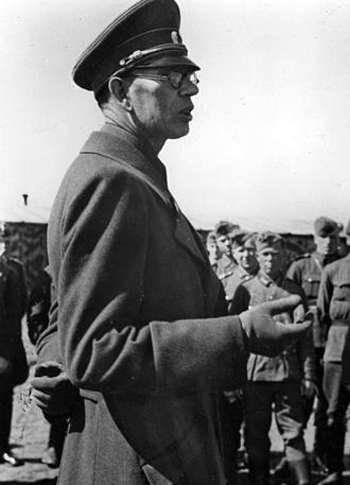 These Russian anti-communist patriots found a leader in Lieutenant General Andrey Vlasov. Highly decorated for his successful defense of Moscow, Vlasov had the distinction of being the first Soviet general to force German forces into retreat. During his attempt to relieve the siege of Leningrad, Vlasov's army failed to receive timely support from other Soviet forces and was surrounded. The Soviet high command offered to fly Vlasov out of the encirclement, but he refused and stayed with his men. His army was eventually overwhelmed and Vlasov hid in the surrounding area for 10 days until his capture on July 12, 1942.
These Russian anti-communist patriots found a leader in Lieutenant General Andrey Vlasov. Highly decorated for his successful defense of Moscow, Vlasov had the distinction of being the first Soviet general to force German forces into retreat. During his attempt to relieve the siege of Leningrad, Vlasov's army failed to receive timely support from other Soviet forces and was surrounded. The Soviet high command offered to fly Vlasov out of the encirclement, but he refused and stayed with his men. His army was eventually overwhelmed and Vlasov hid in the surrounding area for 10 days until his capture on July 12, 1942.
During his imprisonment Vlasov's antipathy to Stalin's police state rule was bolstered by fellow Russian officers sharing similar hatred for Stalin and his communists. Hoping to free his nation from Stalin's tyranny, Vlasov offered his services to the Nazi government as the leader of an anti-communist army allied with the Germans for the liberation of Russian people.
The Russian Liberation Army, however, would be deployed only very late in the war. Elements of the ROA did turn on Nazi forces and prevented Waffen SS units from destroying the city of Prague during that city's insurrection against Nazi occupation in early May 1945. Germany surrendered on May 9, the same day German forces withdrew from Prague.
As the Third Reich collapsed, the ROA and its commanders sought to surrender to American forces, but previous agreements with the Soviets and the reality of thousands of American soldiers who were freed from German prison camps but still under Soviet control, forced the allies to hand over the troops of the ROA and its leaders. (Some American commanders did allow small numbers of ROA troops to slip away into American controlled zones.) The Soviets considered all members of the ROA to be traitors, with the leaders, including Vlasov, being executed.
Not only are the members of the ROA considered as traitors, but the official Russian version of the defense of Moscow excludes Vlasov's actions. Vlasov's very name remains synonymous with treason.
The sad truth is that Soviet-era propaganda remains dominant in today's Russia, and embarrassing historical facts such as Soviet cooperation with Germany and the existence of the anti-communist ROA are ignored or treated in virtually the same manner as in the days of the old Soviet Union.
As in the Soviet-era, in Putin's Russia the only truth is government sponsored truth and that "truth" looks much as it did during Stalin's rule.

Toby Westerman publishes
International News Analysis - Today
An uncompromising weekly analysis of the world situation
Contact T. Westerman at
www.inatoday.com
or P.O. BOX 5182, Rockford, ILL, 61125-0182

Putin sells his version of Russia's past at the annual Victory Day in Red Square, 2017

Putin stated during his 2017 Moscow Victory Day address that World War II showed that "double standards" and "short-sighted indulgences" bring tragic results. He proclaimed that the Great Patriotic War (WWII) was an "outstanding, sacred heroic deed of our people, a call to live according to conscience, to keep the height of truth and justice..."
The phrases "double standards" and "short-sighted indulgences" referred to pre-WWII Western attempts at appeasing Nazi leader Adolf Hitler. Putin was taking a jab at U.S. and European policies, particularly in Syria. He is saying that the U.S. and its allies are weak in the face of terrorism (because of Western support of anti-Assad rebels), comparing this policy to the West's approach to Hitler in the 1930's. As far as Putin is concerned, any group hostile to Assad is a terrorist organization, but using the Soviet relationship to Nazi Germany as an example of resolute resistance to aggression is, however, absurd.
It does make for excellent propaganda for the Russian people and for pro-Putin allies around the world.
As with all myths, there is truth within the general narrative. On June 22, 1941, Nazi forces launched a surprise attack against Soviet Union driving the Red Army back to the gates of Moscow and Stalingrad. Eventually, and with the help of "general winter," Soviet forces prevailed.
Embarassing facts...

Stalin and Ribbentrop sealing
the German-Russian Pact of 1939
From 1929 to 1933 there were even secret German military training and arms development facilities in the Soviet Union, which circumvented restrictions on the German armed forces by the Treaty of Versailles ending World War I. After Hitler came to power in 1933, these facilities were moved to Germany, but Soviet-German cooperation continued.
The height of Nazi-Soviet cooperation came in the August 23, 1939, with the Molotov-Ribbentrop Pact, which specified not only peaceful relations and spheres of influence between the two States, but also enhanced the transfer of German technology for Soviet raw materials.
The Soviets always claimed that they were forced to ally with Hitler in the face of Western inaction against Hitler, but these highly dubious claims were further undermined by active Soviet assistance to Hitler's military and the Stalin's participation in the 1939 invasion of Poland. Both Germany and the Soviet Union saw the re-birth of the Polish State in 1918 as an impediment to their own ambitions. The Nazis attacked Poland on September 1, the Soviets on September 17. Not until the Nazis launched Operation Barbarossa in June 1941 did Stalin break his active support of Hitler and the Nazi regime.
Even after the Nazi invasion the Soviet people were not united in a "sacred heroic deed" to support Stalin's Soviet Union, and the "call to live according to conscience..." meant something quite different to many Soviet citizens than what Putin and Soviet mythology declared.
The Russian Liberation Movement
Little known in this country, and a point of official shame in Russia, was the existence of the "Russian Liberation Army" (ROA) and its leader Andrey Vlasov. Not all Russians who loved their country were loyal to Communism or Stalin. Many Russians were angered at Stalin's reign of terror at home with its never ending killings and constant suspicion of everyone by everyone.
Some Russian prisoners captured by the Germans were willing to take a chance on supporting Germany in hopes of ending Stalin's rule and the domination of Communism. Other Russians, who had fought against the communists in the Russian Civil War, also saw the Germans as possible allies. As noted above, Russian-German cooperation was not a new idea, but existed throughout the years following WWI.

General Andrey Vlasov addressing volunteers to the Russian Liberation Army
During his imprisonment Vlasov's antipathy to Stalin's police state rule was bolstered by fellow Russian officers sharing similar hatred for Stalin and his communists. Hoping to free his nation from Stalin's tyranny, Vlasov offered his services to the Nazi government as the leader of an anti-communist army allied with the Germans for the liberation of Russian people.
The Russian Liberation Army, however, would be deployed only very late in the war. Elements of the ROA did turn on Nazi forces and prevented Waffen SS units from destroying the city of Prague during that city's insurrection against Nazi occupation in early May 1945. Germany surrendered on May 9, the same day German forces withdrew from Prague.
As the Third Reich collapsed, the ROA and its commanders sought to surrender to American forces, but previous agreements with the Soviets and the reality of thousands of American soldiers who were freed from German prison camps but still under Soviet control, forced the allies to hand over the troops of the ROA and its leaders. (Some American commanders did allow small numbers of ROA troops to slip away into American controlled zones.) The Soviets considered all members of the ROA to be traitors, with the leaders, including Vlasov, being executed.
Not only are the members of the ROA considered as traitors, but the official Russian version of the defense of Moscow excludes Vlasov's actions. Vlasov's very name remains synonymous with treason.
The sad truth is that Soviet-era propaganda remains dominant in today's Russia, and embarrassing historical facts such as Soviet cooperation with Germany and the existence of the anti-communist ROA are ignored or treated in virtually the same manner as in the days of the old Soviet Union.
As in the Soviet-era, in Putin's Russia the only truth is government sponsored truth and that "truth" looks much as it did during Stalin's rule.

Posted May 26, 2017
International News Analysis - Today
An uncompromising weekly analysis of the world situation
Contact T. Westerman at
www.inatoday.com
or P.O. BOX 5182, Rockford, ILL, 61125-0182
______________________
______________________
 Volume I |
 Volume II |
 Volume III |
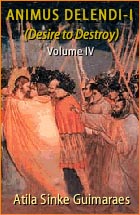 Volume IV |
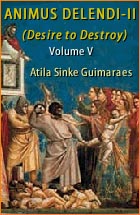 Volume V |
 Volume VI |
 Volume VII |
 Volume VIII |
 Volume IX |
 Volume X |
 Volume XI |
 Special Edition |


